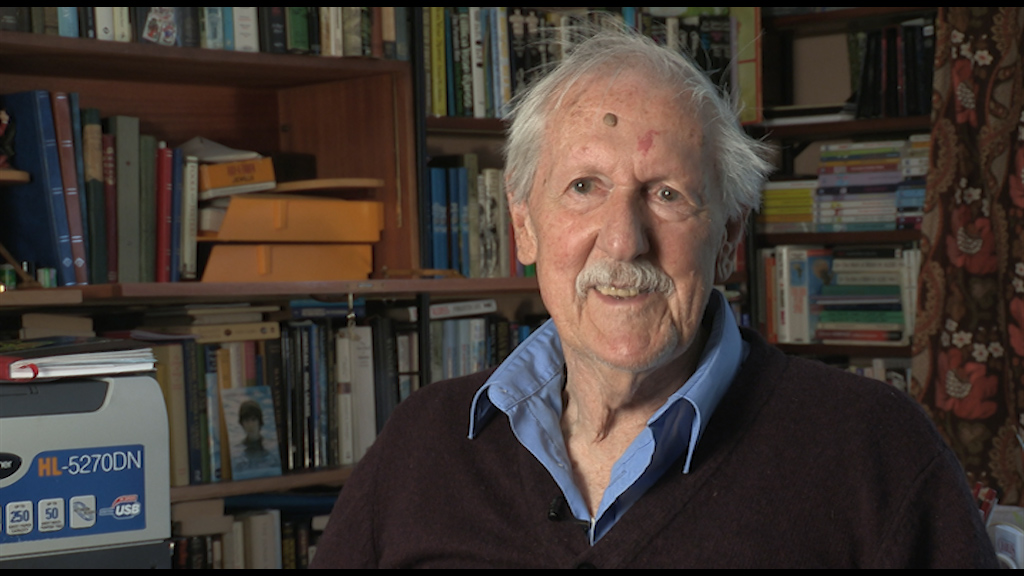NEXT STORY

Stanley Kubrick’s house
RELATED STORIES

NEXT STORY

Stanley Kubrick’s house
RELATED STORIES


|
Views | Duration | |
|---|---|---|---|
| 61. Hidden treasures of Serbia | 53 | 02:44 | |
| 62. Lord Byron’s legacy to Montenegro | 51 | 02:09 | |
| 63. Nocturnal yodelling on the island of Mljet | 29 | 02:15 | |
| 64. The Englishman’s aversion to science fiction | 54 | 04:12 | |
| 65. Without science fiction there’d be no Bovril | 71 | 03:25 | |
| 66. More on Billion Year Spree | 49 | 04:33 | |
| 67. Stanley Kubrick’s house | 313 | 03:46 | |
| 68. Working with a genius | 219 | 02:43 | |
| 69. Stanley Kubrick sets the bar high | 155 | 03:56 | |
| 70. Steven Spielberg steps into the breach | 117 | 02:58 |


I wrote Billion Year Spree, and that was to talk about the earlier things, including of course, Mary Shelley's Frankenstein. Mary Shelley had the misfortune, when she was a baby, to have her mother die almost directly after birth. Now, I've always thought that the doctor had dirty, unwashed hands, and that was what killed the mother. And so, Mary lived under that spell and wrote Frankenstein about a creature that has no father. It was her way of dealing with her own misfortune. That I understand, that seems to be a very sensible use of fiction. So, of course, I included that.
And, when it came to the American version... I did get an American version published... but no science fiction magazine would publish it, because it disputed the fact that science fiction had begun with the United States. And so, Harry was the guy who wrote to the editor and said, 'What are you doing? Why aren't you reviewing Brian's book? Can't you see how much better it is than anything so far published on the subject? I insist that you publish this book'. Good old Harry. And so, eventually, they did review it.
But, I mean, that was a case of my staunch independence. And since then... I went … I used to go every year to the Conference of the Fantastic... and they all forgave me. They all understood the situation. A bit of a mistake had been made, OK. And so, one hopes to go on like that, correcting mistakes – other people's mistakes, not one's own mistakes, of course.
And so, I suppose, we really get to the end of our tether except to tell you that I'm now writing two things at once. You might think that at my age, I'd be taking it easy. This is not the case. I'm writing a very long and difficult novel about a man who walks a thousand miles from Moscow to the River Lena. This I've started three times... each time I've not liked it and I've started again, and I haven't got very far with it, and one reason is, that I've been interrupted by my wonderful publishers, who are known as the Friday Project, and are run by Scott Pack, who is funded, actually, by an old publisher of mine called... what are they called? They've got a hyphen name – Harper-Collins, Harper-Collins, yes.
He is getting me to write about – well, you'll find this rather similar – writing about people I've known. Just sort of a page or two maybe, maybe three. And this collection will eventually be published not as a maze of stories, but something vaguely similar... just the people that I've worked with over the years which are many.
Brian Aldiss (1925-2017) was an English writer and anthologies editor, best known for his science fiction novels and short stories. He was educated at Framlingham College, Suffolk, and West Buckland School, Devon, and served in the Royal Signals between 1943-1947. After leaving the army, Aldiss worked as a bookseller in Oxford, an experience which provided the setting for his first book, 'The Brightfount Diaries' (1955). His first science fiction novel, 'Non-Stop', was published in 1958 while he was working as literary editor of the 'Oxford Mail'. His many prize-winning science fiction titles include 'Hothouse' (1962), which won the Hugo Award, 'The Saliva Tree' (1966), which was awarded the Nebula, and 'Helliconia Spring' (1982), which won both the British Science Fiction Association Award and the John W Campbell Memorial Award. Several of his books have been adapted for the cinema. His story, 'Supertoys Last All Summer Long', was adapted and released as the film 'AI' in 2001. His book 'Jocasta' (2005), is a reworking of Sophocles' classic Theban plays, 'Oedipus Rex' and 'Antigone'.
Title: More on "Billion Year Spree"
Listeners: Christopher Sykes
Christopher Sykes is an independent documentary producer who has made a number of films about science and scientists for BBC TV, Channel Four, and PBS.
Tags: Frankenstein, Mary Shelley
Duration: 4 minutes, 33 seconds
Date story recorded: September 2014
Date story went live: 17 August 2015